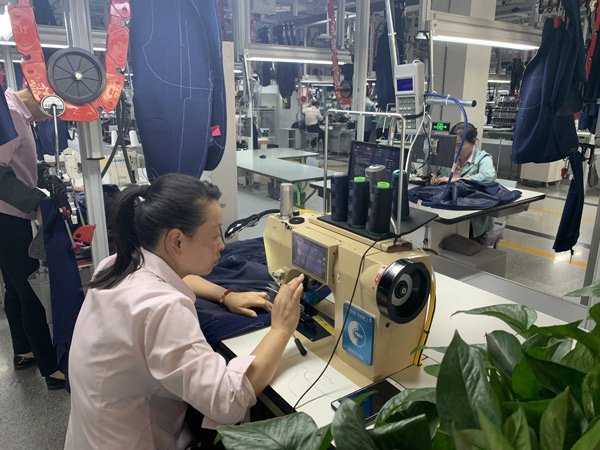Rag trade a rich seam for Ningbo


A worker makes suits at Youngor in Ningbo, guided by an interactive system. [Photo by FANG AIQING/CHINA DAILY]
With a heritage dating back to the early 20th century, the city's garment sector is now benefiting from an industrial upgrade, Fang Aiqing reports.
Ningbo in East China's Zhejiang province has such a long dressmaking tradition that its tailors from the banks of the Fenghua River, known as hongbang ("red band"), have enjoyed enduring fame since the early 20th century.
The group initially gained recognition for making suits for foreigners before garnering acclaim for inventing the iconic Chinese tunic suit and setting up formal suit-making schools.
While some of the current generation of Ningbo's hongbang tailors have continued to specialize in customized suit-making, others have helped to turn Ningbo into one of China's main fashion cities through their integrity, innovation and entrepreneurship.
There are now over 16,000 textile and garment companies in Ningbo producing 1.5 billion items of clothing annually with a turnover of 110.8 billion yuan ($16.2 billion), according to Zhejiang Daily.
Government statistics show that 501 major enterprises contributed 13.9 billion yuan in added value in 2018, showing a growth of 5.2 percent year-on-year. The combined industrial output of these enterprises reached 55.1 billion yuan last year, an increase of 9.1 percent over 2017.
Fang Wei, deputy director of the economic and information technology committee of Ningbo, says the textile and garment sector accounts for 7.29 percent of the total industrial output of the entire city.
"Although the relative proportion (of garment companies) has gradually dropped, it's still a pillar industry," Fang says.
The garment sector has formed a complete industry chain, covering all sectors, according to Yang Jie, chairman of Ningbo Hixpo Conference and Exhibition Co Ltd and organizer of the annual Ningbo International Fashion Fair.
MOST POPULAR
- 1 $39.7 billion worth of deals inked at Airshow China
- 2 China announces tax relief measures to stabilize real estate sector
- 3 A look at China's economy in October, 2024
- 4 Public holiday extension announced
- 5 China's NEV annual production hits 10 million milestone amid global carbon reduction efforts
Editors' Picks
 Infographic:
Golden jubilee of China-Brazil relations
Infographic:
Golden jubilee of China-Brazil relations
 Infographic:
A look at China's economy in October 2024
Infographic:
A look at China's economy in October 2024





